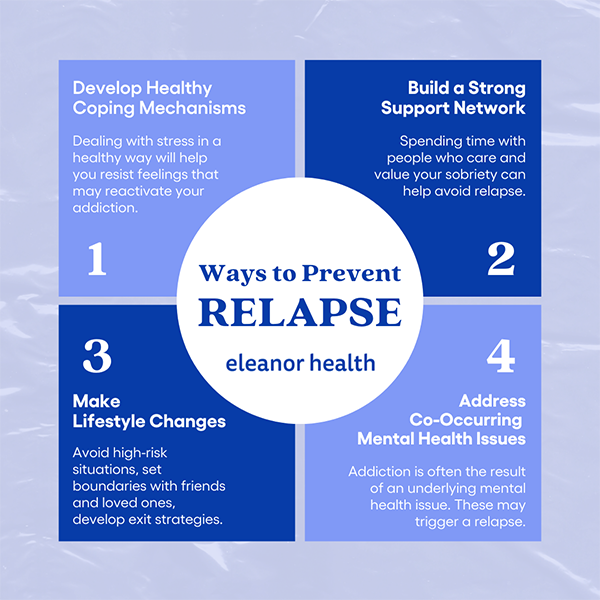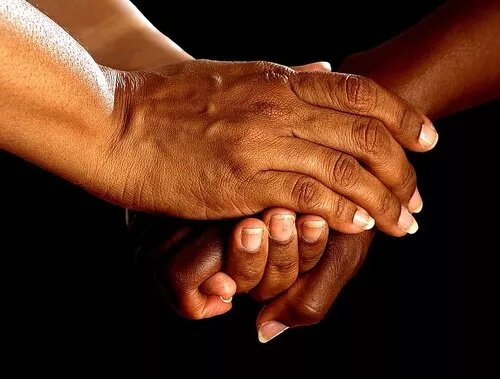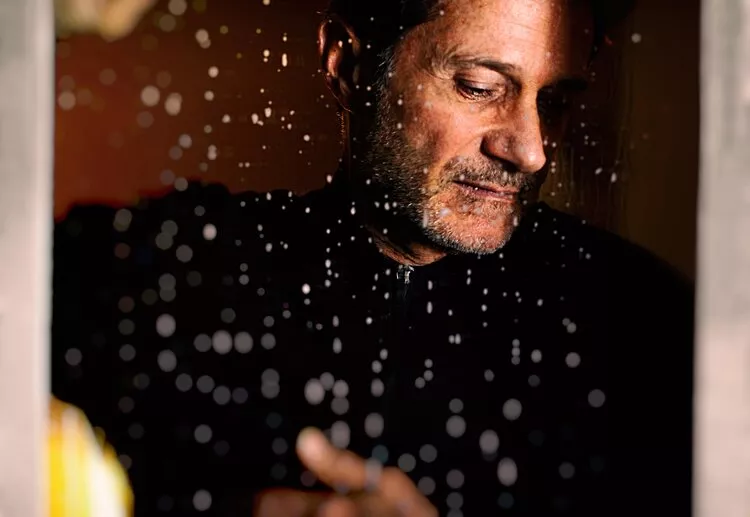Addiction or substance use disorder is something that, like many diseases, can happen to anyone. One person is exposed to painkillers after an injury, and addiction forms before they are out of the hospital. Another takes a few ‘study drugs’ in college and finds they feel a powerful need to stay sped-up. Addiction can form around behaviors, too, like gambling or risk-taking which trigger certain neurotransmitters that can cause an uncontrollable desire for more.
Unfortunately, the influence of addiction never completely goes away. Like many chronic illnesses, it exists in a dormant state while you are living a good and careful life. But anyone can experience a relapse, especially in times of stress, difficulty, or triggering exposure.
According to the National Institute on Drug Abuse (NIDA), between 40% and 60% of people who have been through substance use disorder treatment will experience a relapse at least once. This is similar to relapse rates of other chronic diseases like hypertension and asthma, which stay with a person for their entire life. A relapse does not mean that a person or treatment plan has failed. It just means that your addiction treatment program needs to be fine-tuned.
If you have recently experienced a relapse, are worried about the risk of relapse, or know someone in this situation, it can help to understand the nature of relapse and it’s role in the addiction recovery process.
Relapse can be caused by both internal and external triggers, as well as life circumstances that can increase the risk of a relapse occurring. External triggers include environmental factors like certain places or people, while internal triggers encompass mental and physical responses to stress, emotions, or memories. Relapse usually occurs when your defenses are low, when you are struggling to maintain your supportive routine that helps to keep the addiction at bay. You may also have specific triggers (whether external or internal) that cause cravings to return, which can quickly result in a relapse if you cannot immediately call on your support system to regain control. Common relapse triggers include:
Environmental triggers include places, people, and situations that are strongly associated with your memories of addiction. For example, many people unconsciously reach for their substance of choice when they hear fighting, when they see something upsetting, or when they spend time with people who used to share their addiction habits.
Mental triggers relate to your mental health. Relapse may be lurking for anyone. Triggers might include experiencing trauma, stress at work, conflict with a loved one, or re-activation of an untreated mental health issue.
Physical triggers may be engaging in activities that used to be associated with your addiction. But it could also include your response to physical pain or other sensations that used to cause you to reach for your substance. Stopping medication for addiction treatment can also be a physical trigger.
Coping Mechanisms:
You may have once coped with difficult situations through substance use. This includes mental health issues or conditions like social anxiety. Triggering your need for a coping mechanism can also trigger a relapse.
Lack of Support System:
Feeling alone, especially around triggering circumstances, can lead to relapse when you don’t have a support system to call upon to help you avoid relapse.
Unresolved Emotional Issues:
When emotional issues, such as childhood trauma, contribute to your addiction, facing those emotions again or their aftermath can make relapse more likely.
Relapse doesn’t happen suddenly. It’s actually a gradual process that occurs in three distinct stages. Understanding these three stages of relapse can help you or your loved ones recognize the warning signs of relapse early and take action before a physical relapse occurs.
Stage 1: Emotional Relapse
During emotional relapse, you’re not consciously thinking about using, but your emotions and behaviors are setting you up for a possible relapse. Warning signs include:
Not taking care of your physical health
Bottling up emotions
Isolating from friends and support groups
Skipping recovery meetings
Poor eating and sleeping habits
Stage 2: Mental Relapse
In this stage, there’s an internal war between wanting to use and wanting to maintain sobriety. Signs include:
Planning how you would obtain and use substances
Thinking about people and places associated with past use
Glamorizing past use while minimizing consequences
Bargaining (thinking you can use just once)
Actively looking for opportunities to relapse
Stage 3: Physical Relapse
This is the actual act of returning to substance use. By the time someone reaches physical relapse, they’ve typically been struggling through the emotional and mental stages for some time. This is why recognizing and addressing early warning signs is crucial for prevention.
The sooner you recognize the early stages of relapse, the easier it is to prevent a full physical relapse. If you notice signs of emotional or mental relapse, this is the time to reach out to your support system and put your relapse prevention strategies into action.

One of the biggest risks of a relapse is overdose. Consider someone who has given up desserts for a year and finally decides to eat cake at a party. Their first return to sugar, it can be all too easy to get sick instead of indulging just a little. Returning to drugs or alcohol, however, is far more dangerous. Your tolerance has been reset, and your craving may be extremely powerful. Together, these factors can result in an accidental overdose and even death.
While relapse can happen to anyone, developing a comprehensive relapse prevention plan and implementing specific strategies can help reduce your risk and prevent triggers in the future. These methods can keep you from experiencing triggering emotions or stress and ensure that you have a support system to fall back on.
Stress is often a triggering factor for a relapse. Therefore, developing good coping skills to deal with stress and difficult situations will help you to resist the feelings that may reactivate your substance use disorder. Learn techniques like mindfulness and meditation. Build routines and rituals you can use to focus your mind and balance your emotions.
People in recovery need a support network of friends, family, and their recovery community to rely on. When you start to feel lonely, stressed out, or out of control, spending time with people who care about you and value your sobriety can help you avoid a relapse. A good friend or protective family member can help you stay on track and provide emotional support when you are most at risk of repeating old behaviors. Organizations like Alcoholics Anonymous (AA) and other support groups can be invaluable parts of your support network, offering regular meetings, sponsorship programs, and a community of people who truly understand the recovery journey. These structured support systems complement the care you receive from friends and family, giving you multiple layers of support to turn to when needed.
The more you change your life from the lifestyle you associate with addiction, the easier it will be to maintain long-term sobriety. Avoid high-risk situations, set boundaries with friends and family, and develop exit strategies for situations that you feel may be triggering. New routines, environments, and valuable new people in your life can also make a big difference.
Are there mental health problems you’ve noticed are related to cravings? A panic attack, irrational anger, feelings of insecurity, experiencing fear over certain issues; these can become closely tied to addiction. In part, because substance use is often your original coping strategy for these mental illnesses. Seek out mental health treatment for anxiety, depression, and ADHD that can internally trigger relapse conditions. Your healthcare provider will create a personalized treatment plan that addresses both your addiction and mental health needs. Sometimes, medication can help to balance the chemicals in your brain in a way that you once tried to achieve with substances.
If you should have a relapse, don’t panic. Don’t fall into a spiral of self-hate or give up on your sobriety. Everyone slips from time to time. After a relapse occurs – or even during a relapse if you become self-aware in the midst – is to minimize the damage to yourself and your life. Get rid of any substances, leave triggers, and get home safe.
Call a loved one, sobriety sponsor, therapist, or support group. Talk to someone who cares about you and who will give you good, practical advice. Have someone stay with you for the night, or for a few days, to help you get through the worst of the relapse and detox experience. This is when you need your support system the most.
If you are not currently in treatment for addiction, after a relapse is an important time to restart. Become part of a group, join therapy, or even attend a period of rehab, if you feel this is right. If you are involved in treatment, look for options to adjust treatment and increase the support you are getting from your treatment program.
After a relapse, it’s also important to forgive yourself and move forward. Use this as a learning experience. Become more familiar with your triggers, reinforce your support system, and try to rebuild your confidence and resolve to be your best, sober self.
The risk of relapse is a lifelong consideration in your recovery, but it becomes more manageable with time. As you build stronger coping mechanisms and establish a stable recovery routine, the rate of relapse typically decreases. However, it’s important to maintain vigilance and continue practicing relapse prevention strategies throughout your road to addiction recovery.
A slip is typically a brief, one-time return to substance use, followed by an immediate return to the treatment plan. A relapse, on the other hand, often involves a longer period of sustained use and may require more intensive intervention or additional treatment to get back on track. Both situations require immediate attention and peer support, but understanding the difference can help guide the appropriate response.
Being honest about relapse is crucial for addiction recovery. While shame and guilt might make you want to hide it, telling your support system allows them to help you get back on track quickly. This transparency also helps maintain trust and ensures you get the support you need to prevent future relapses.
A comprehensive relapse prevention plan typically combines several therapeutic approaches, including cognitive-behavioral therapy and regular therapy sessions. Your treatment team may use motivational interviewing to help identify your triggers and develop personalized coping strategies. The plan should outline specific actions to take when facing triggers, list emergency contacts, and include strategies for maintaining long-term recovery. Regular review and updates with your treatment team help ensure the plan remains effective as your needs change.
Family therapy plays a crucial role in addiction recovery by healing relationships and building a stronger support system. These sessions help family members understand addiction, improve communication patterns, and learn how to support recovery effectively. Through family therapy, loved ones can identify enabling behaviors, establish healthy boundaries, and create a home environment that supports long-term sobriety. Many treatment programs combine family therapy with other approaches like contingency management to reinforce positive behaviors and strengthen recovery outcomes.
Whether you are currently struggling with addiction, fear relapse, or are facing the aftermath of a recent relapse, Eleanor Health is here to help. We offer flexible treatment options, including outpatient programs and online treatment, to fit your schedule and needs. Contact us today to explore the treatment and support that we can offer.
 How To Help Someone Through Drug or Alcohol Withdrawal
How To Help Someone Through Drug or Alcohol Withdrawal
 Signs and Symptoms of Drug Addiction – How to Tell if Someone Needs Help for a Drug Problem
Signs and Symptoms of Drug Addiction – How to Tell if Someone Needs Help for a Drug Problem
 How to Tell Your Family That You’re Struggling With Addiction
How to Tell Your Family That You’re Struggling With Addiction